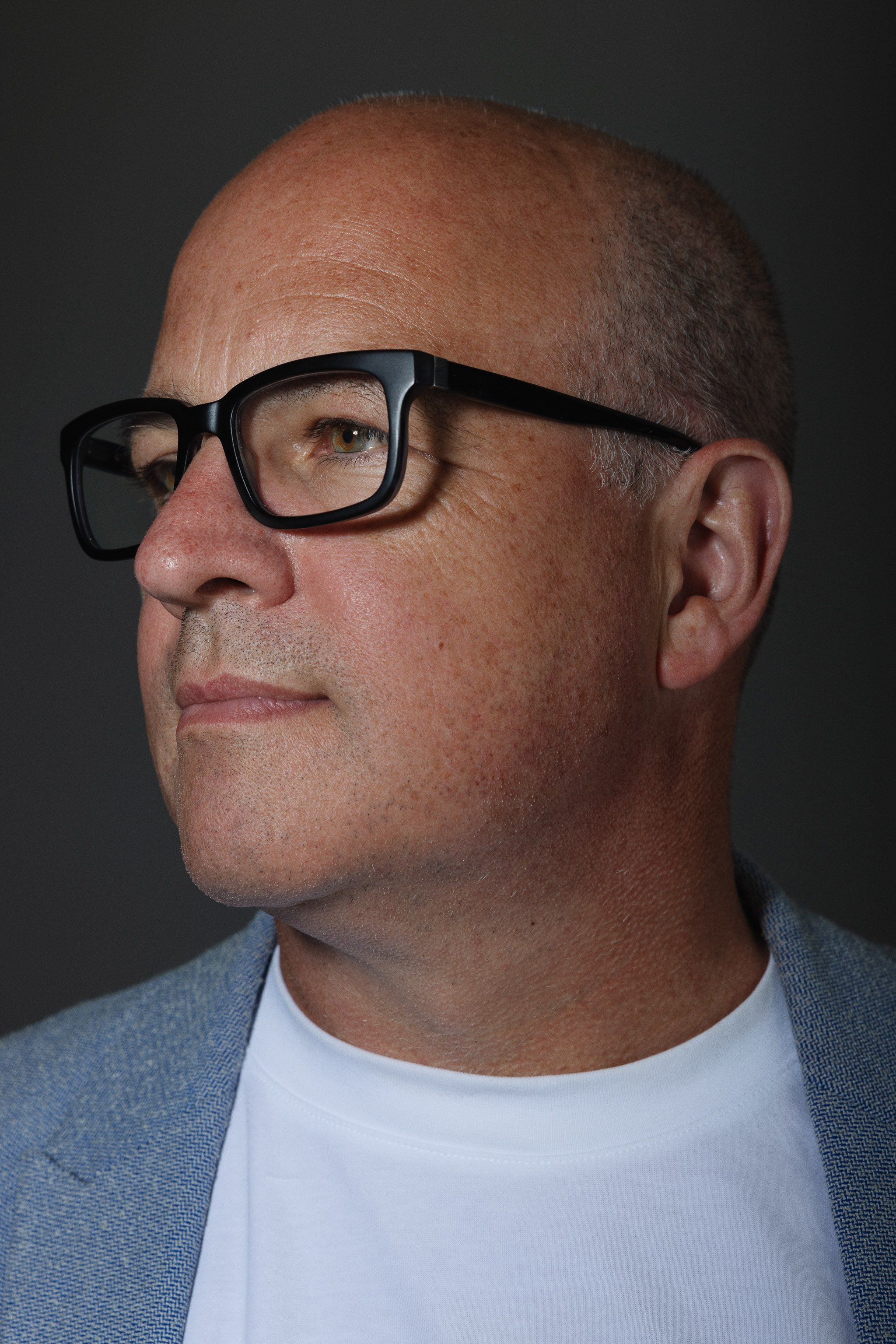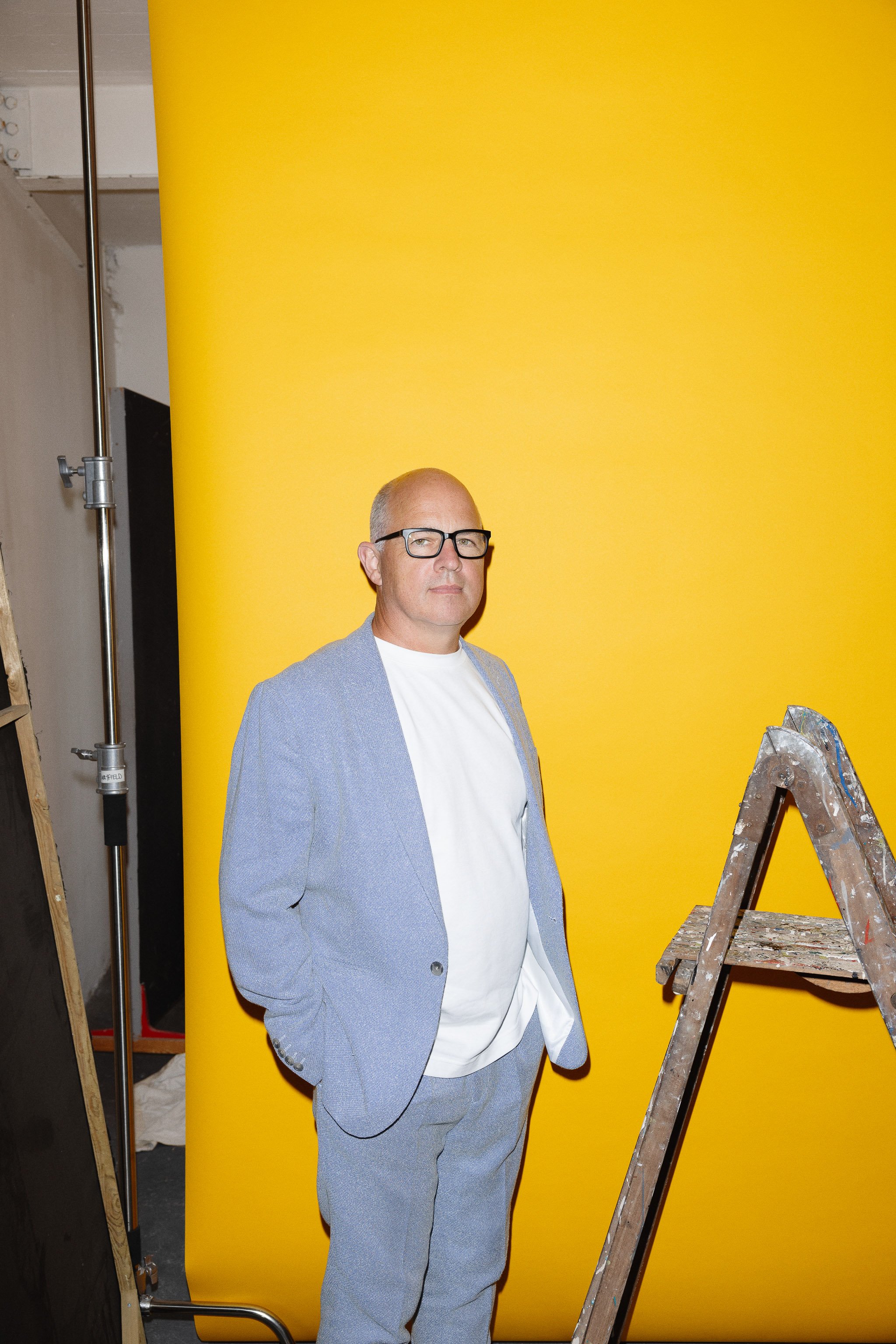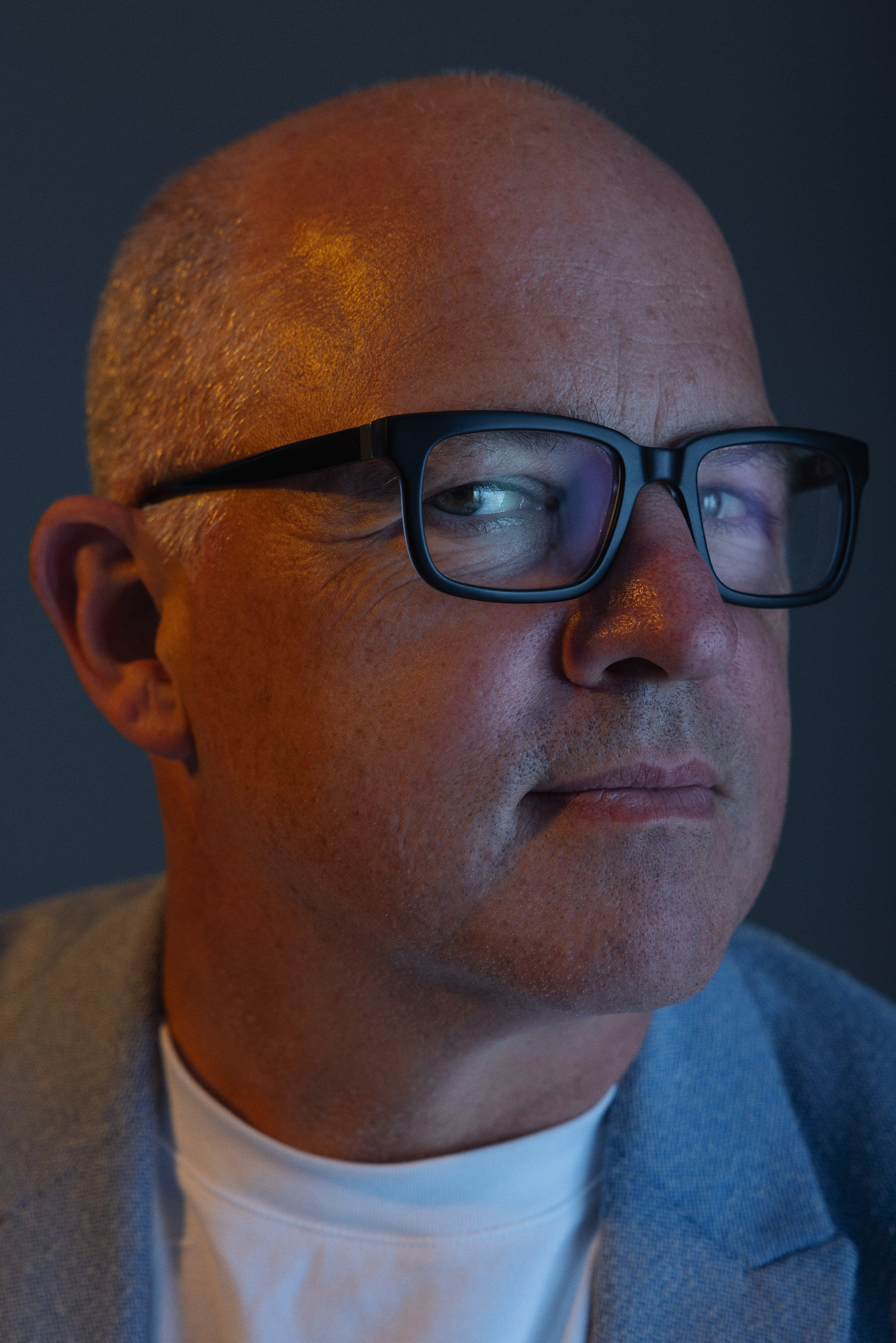“The sci-fi reality”
of AI in PR
Stephen Waddington
Stephen Waddington has made a career of riding waves of change in the PR and communications industry. But what does someone who was one of the first movers responding to the rise of the internet, and then social media, think about the arrival of AI?
Interview by Arlen Pettitt
Photographs by Christopher Owens
I arrive a little early at the studio for my interview with Stephen Waddington and Chris is still finishing up with his previous shoot.
He's passing some shots through an AI tool called Midjourney, while an impossibly handsome and chiseled lad named Jamie watches a synthetic version of himself appear through the virtual haze.
In one version he's got extra tattoos, in another more jewellery, in a third his clothes have changed, in a fourth his facial features are ever-so-slightly heightened.
You'd have to look closely to spot the differences, and spot the uncanny nature of the AI's lens.
It's interesting to watch, because AI is also what I'm going to speak to Stephen about.
"You have to understand it, you have to understand the impact of it and see its strengths as well as its weaknesses"
Stephen Waddington is the founder and managing partner of professional advisory firm Wadds Inc and a co-founder of Socially Mobile CIC, as well as a PhD student at Leeds Business School.
He's also PR industry royalty, as a past President of the CIPR, with six years as Chief Engagement Officer at Ketchum, and a successful and influential career in the industry stretching back to the mid-1990s, including as a founder of agencies Rainier PR and Speed.
But he began life as an engineer, not a communicator, and this has set him apart.
"I did an electronics degree," he explains, "so comms, public relations, it wasn’t a natural domain for me to go and build a career in. But, I was interested in technology and the communication component of it."
A spell as a technical editor at an electronics magazine was followed by time in technical and product communications for ARM, before he spotted an opportunity in the growth of the internet, helping the companies involved in that process build their reputations.
"I created an agency with a mate of mine," he says. "It was quite dull really, but we were working with the companies who were building the plumbing of the internet, then that first application layer. That exposed me to the heart of the Dot Com boom, and all of the madness around that when retail got impacted by the internet."
Having spotted the opportunity with the internet, he then spotted a second opportunity with something being built on it - social media - forming a second agency aimed at helping brands figure that out.
"That’s when I had my eureka moment," Waddington explains, "and recognised that it’s quite unusual to have people from a technical, engineering background in communications and public relations, and that perspective has definitely been a defining characteristic of my career."
He explains how each wave of his career has followed a moment of innovation in the industry - first the internet, then social media, and now AI, a topic he began looking at more than five years ago as chair of a CIPR panel assessing its possible impacts on the sector.relationships.”


This career evolution by innovation is driven by professional curiosity, and his desire to stay ahead of the game.
In the course of writing and publishing books on the industry, and now studying a PhD in the subject, Waddington has discovered "how weak the foundational theory in public relations is and the exposure of practioners is to that theory."
"There’s two sides to it," he continues, "the theory is not very well shared between the academic domain and practice, and public relations is very poor at learning and developing."
In his view, a reason for that is the route people take into the industry, and the characteristics it tends to attract.
"I think people fall into a career in comms - I fell into a career in public relations, comms," he says. "It’s one of those careers which bridges creativity and a profession, that's its hinterland, that’s great for diversity and access but it does mean there’s no formal requirement for learning to build knowledge through your career. So you’ve got to be fairly motivated to do that."
I ask whether the lack of structured professional development leaves comms people on their heels when big changes come along. Stephen rightly identifies that as a leading question, but does talk fluently about how the arrival of the internet and social media both resulted in the creation of new jobs, skillsets and auxiliary sub-industries around things like building websites, search engine optimisation, content marketing and a host of others.


“Kids telling their parents who are leaders of organisations, you should look at this mum, dad, and suddenly they go ‘shit, we better look at this’ and they go ask the questions in the board room and look for answers. That’s when the change happens, when it’s forced.”
From those previous waves of change, he can also see a now familiar reaction.
"With AI, it’s exactly the same," he says, "history is repeating itself. You’ve got the two schools of thought, borne out by data, people leaping into it and people saying it’s a massive risk. Undoubtedly from a management perspective, there are huge risks, related to misinformation and copyright - not to dismiss them, they are really significant - but instead of dismissing it, trying to put it back into a box, wouldn’t it be much better to say I’m going to go investigate this and figure out how I can become a domain expert in it?"
Although he'd been watching AI's development and prompting the industry to take it more seriously for years, November 2022 was a watershed moment with the launch of Open.ai's ChatGPT.
"Before November 2022, AI was typically dealt with within a large organisation by an R&D team, maybe an innovation team," he says. "After November, every board became aware of it, typically driven by the younger generation - kids telling their parents who are leaders of organisations, you should look at this mum, dad, and suddenly they go ‘shit, we better look at this’ and they go ask the questions in the board room and look for answers. That’s when the change happens, when it’s forced."
Such was the clamour for understanding, Wadds Inc has published a paper on the management implications of AI, especially for comms teams and agencies.
Even if agencies theoretically wanted to employ AI tools, what about trust, I ask, given reports of chat bots making some glaring errors.
"There’s a whole load of concern around this term ‘hallucinations’," says Waddington, "which describes the fact that if an AI system within its large language model hasn’t got an answer, it will find the next best answer because of the way it structures and organises responses. It’s looking for themes around issues and topics relating to the organisation of words and phrases, if it hasn’t got an answer it will find the next best, and tell you that with absolute conviction."
He recounts the experiences of the Guardian, who have found AI in their newsroom is hallucinating in about 10% of cases, even when working from original content supplied by journalists.
Alongside the errors there are also the biases.
Waddington says his wife Sarah rants at their Alexa device, because it struggles to understand her Geordie accent. I say my wife Kate is convinced our Google Home hates her because it only listens to me.
"There is something there though," he says. "These models, these technologies, have all been built by middle-aged men, typically with a western perspective, in San Francisco, so it totally reflects that bias."
"This is why I can’t understand people who say ‘put it in the box, ignore it’," he says, "because you have to understand it. You have to understand it, you have to understand the impact of it and see its strengths as well as its weaknesses, so you can provide that advisory expertise and be able to talk about it."
However, not all of the risks associated with AI are accidental, some relate to how the tools can be used.
We live in an age of fabrication and misinformation, and November’s coming out party for AI has already seen images circulating of the Pope in a puffer jacket, and Donald Trump wrestling with police. In April, the US Republican Party released a campaign ad which featured AI-generated images of a dystopian future under a second Biden term.
As someone in, and advising, the communications industry, Waddington is concerned what the proliferation of AI tools will mean for political dialogue.
“We’ve got an election coming up in the UK in 18 months,” he explains, “and we’ve got an election in the US within 12 months, and that’s when this technology will be tested in anger and weaponised, as it was during the Brexit referendum, the election that followed and the last US election.”
“This terrifies me,” he continues. “The ability to create - whether it's with Bard or ChatGPT - very convincing material very quickly, is absolutely terrifying. You can imagine you then very quickly feed that out into social forms of media, you can create images alongside that and essentially create a machine that will weaponise the political sphere and absolutely pollute it.”
Stephen paints a picture about how this generated content can play to our prejudices - for example, how a doctored video of Joe Biden tripping and falling could confirm preconceptions that he’s too old to be President.


As a PhD student, Waddington is examining how public relations contributes to the management of organisations, and that has led him to research the history of the industry, which began as a means of sharing public information after the Second World War, but later became - in Stephen’s words - “fixated with the media as proxy for reaching the public”, despite that being just one communication channel.
The media landscape now is unrecognisable to the post-war one, and Waddington talks about how a transition from two news cycles a day - the morning paper and the evening paper - to a constant, compressed cycle fed by rolling news, has made fact-checking and reasoned response difficult.
He calls media education in the UK, as well as elsewhere in the west, “awful” and points to the recent tussle between The Sun and the BBC as an example.
“We saw it with what happened with Huw Edwards,” he explains, “it’s completely asymmetric. The Sun has put forward a premise, then the BBC has had to respond because it’s got a public need to, but then you see the BBC doubling over itself with scrutiny. But you haven’t seen a journalist or an editor from The Sun. And here we are, we’re all thinking it’s a BBC crisis, but it’s not, it should be a crisis of News UK, a The Sun crisis.”
It was compounded by the condensed newscycle, he says, because “the idea that the BBC could say they need a week to investigate this and come back with a response just wouldn’t be allowed.”

“Suddenly anyone with a web browser and access to the internet could do this stuff, so you can touch it, feel it and see it.”
With the rise of AI set against a backdrop of a comms industry which isn’t good at evolving, a lack of media education and a political discourse primed for misinformation, I can feel myself slipping into the ‘put it back in the box’ camp.
But, Stephen is more hopeful when describing how AI can change how public relations and communications people work.
“There are two areas,” he says, “it’s going to help us work more effectively, or help us work more efficiently. It depends whether you take the optimistic or pessimistic perspective of it. Optimistically it is like having a research analyst, an assistant, sat beside you which can help you undertake tasks far more efficiently than you have done before.”
He says he’s already begun using tools like ChatGPT, Otter.ai and Firefiles to automate tasks like notetaking in meetings or contact reports, as well as for summarising reports and papers.
“We talk a lot about generative AI,” Stephen explains, “but reductive AI is just as exciting or more exciting. Part of the seeming appeal of artificial intelligence is that it has intelligence…it doesn’t at all, it’s artificial, it doesn’t have the ability to create new knowledge. It can’t do it. It can help you as a human being make sense of large amounts of data and draw patterns out of the data to build knowledge. But it hasn’t yet been proven to build knowledge.”
“There are some terrific examples of where datasets have been brought together in the health industries,” he continues, “or within aspects of science and that, really, was the first power application for me. To be able to pull together a number of interviews or, in research, a number of papers and start to look and spot trends in disparate sources of data and make sense of those, that, for me, is absolutely powerful.”
Waddington sees corollaries between this wave of innovation and previous ones, in that new skills will be needed, new roles will emerge and specialists will emerge to prop up the central PR and comms industry.
In his view, the ability to prompt AI, or build new tools and functionality from it, will be critical, and some of the more mundane tasks of PR and comms - tasks like reporting and monitoring - will disappear.
What won't ever be replaced is the human interaction element of the job, those all-important relationship management roles.
Grasping the capabilities of AI will present huge opportunities for individuals too.
“You have a moment right now - as happened with the internet, with social media," Stephen explains, "where if you are ahead of this it will act as a natural accelerant in your career. You’ll build domain knowledge that will enable you to get ahead, because organisations want to hire people who understand what’s going on and are able to apply that in their business.”
“It doesn’t matter what sector you operate in," he continues, "we’ve talked a lot about the professional domains - I think those are going to be the ones that are the most disrupted, at least initially - but it will have an impact on every organisation. I’d say use that knowledge then to influence your management, show that you’ve volunteered to help figure this through. The smartest organisations are pulling together cross-functional teams to think about this. If your organisation doesn’t listen, suddenly there’s a wealth of opportunity to get ahead by developing the domain expertise and going to work for someone who’ll appreciate it.”
The rules and norms of AI use are still being established, and Waddington isn't convinced we'll all be telling the world every time we use it, because we don't usually disclose when we're using tools.
He compares it to using Word's spellchecker, or image optimisation in Adobe products, and suggests it will swiftly become an everyday thing once integration with day-to-day software like Microsoft's products arrives, which is expected by next summer.
There's less flexibility for the media, however.
“In the media at the moment," Stephen says, "where newsrooms are using AI to generate sports reports or reports on stock movements, you’ll see ‘this is generated by AI’, probably as much as an arse-covering exercise as a public disclosure. We need to be careful about it, it needs regulation really.”
That regulation is on the horizon, with a parliamentary panel investigating the impacts of AI, and big tech and industry associations like the CIPR are feeding into that process.
The problem, Waddington explains, is that you can't have regulation sitting there ready for "when the sci-fi reality turns up", so in the short term there will be test cases around copyright and disclosure, and the boundaries will be pushed.
In Waddington's view, it's wrong though to think of this as something conceptually new. What's changed is we are feeding AI more and fresher data than ever before, with a greater variety of uses, and far greater access to it.
"This stuff has been with us since the 1950s," he says. "Since then we've been trying to teach machines to have artificial intelligence and develop this technology."
So, what's happened isn't new technology, it's democratisation, he argues, because "suddenly anyone with a web browser and access to the internet could do this stuff, so you can touch it, feel it and see it."
And that's undoubtedly exciting.






